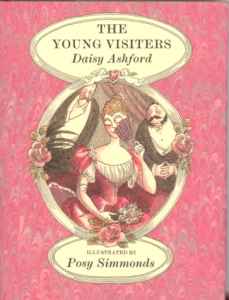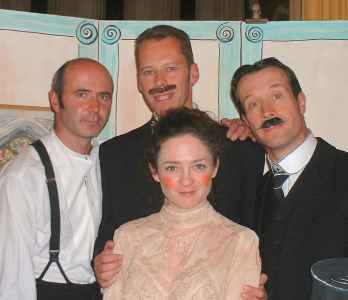
The Young Visiters has been a cult classic since it was published in 1919; it has remained continuously in print since that time (most recently, with illustrations by the wonderful Posy Simmonds). And its themes are those of the classic Victorian novel: love, marriage, money and class. But what makes The Young Visiters unique is that its author, Daisy Ashford, wrote it when she was nine years old. As her grandson, Terry Rose, explains on the Amazon page about the book:
"That it was published at all is almost as remarkable a story as the book itself. Daisy and her sisters came upon a bundle of notebooks neatly tied and stored whilst clearing their mother's house following her death. They found The Young Visiters so amusing Daisy sent it to a sick friend to cheer her up. She in turn passed it to Frank Swinnerton, a novelist and reader for Chatto and Windus who believed it could be successfully published.
What followed would these days be thought of as clever marketing but in fact was quite unintentional back in 1919 when the book was first published. JM Barrie agreed to write the preface and an amazed public, unable to accept that a 9 year old could have possibly written it assumed that Daisy did not exist and that Barrie was the author. This resulted in huge amounts of publicity on both sides of the Atlantic and The Young Visiters immediately became a bestseller. Daisy, always shy and modest had to take to giving readings in London to dispell the myth that Barrie was the author."
The text of The Young Visiters reveals the author to have an acute ear for what adults say, but rather less grasp of why they are saying it, or how they spell (and punctuate) it. This, for example, is the letter which Mr. Salteena writes to his old friend, accepting the invitation which sets the story in motion:
My Dear Bernard
Certinly I shall come and stay with you next Monday I will bring Ethel Monticue commonly called Miss M. She is very active and pretty. I do hope I shall enjoy myself with you. I am fond of digging in the garden and I am parshial to ladies if they are nice I suppose it is my nature. I am not quite a gentleman but you would hardly notice it but cant be helped anyhow. We will come by the 3-15.
Your old and valud friendAlfred Salteena.

It would be a joy to read aloud, and Paddock Productions' adaptation recognises this. The characters do not simply speak the dialogue of the original, they reproduce the book word for word, dividing the narrative between the characters. This conveys the extent to which the author speaks through her characters: Martina Clarke as Ethel conveys young Daisy's enthusiasms, not only for the lovingly detailed clothes but also for sweet things, such as "A glorious tea ... on a gold tray two kinds of bread and butter a lovly jam role and lots of sugar cakes." But it allows some wicked emphasis to point out the many unintentional improprieties (Mr. Salteena's fond farewell to Rosalind the housemaid, for example). Although the programme describes the play, quite accurately, as "A Tale for Grown-ups written by a Child", it was noticeable that the many younger people in the audience were as appreciative (and laughed as much) as their elders.

The production, designed by Num Stibbe, makes ingenious use of simple resources, from the constant changes of hat, most of which cheerfully decline to correspond to the descriptions in the text, to the versatile screen which can be folded this way and that, suggesting now a domestic interior, now a railway carriage and now a rowing boat on the Thames - even, with he deft conversion of an oar into a shady tree, a grassy riverbank just right for a romantic interlude. The gothic splendor of the Joachim Room gave added point to remarks about Bernard Clark's "very sumpshous house."
Martina Clarke plays Ethel Monticue ("quite a young girl") as a predecessor of Lorelei Lee; Jonathan Cullen directed the production, as well as playing Mr. Salteena ("an elderly man of 42 [who] was fond of asking peaple to stay with him") with great sympathy; Richard Hahlo plays two rather predatory gentlemen, Bernard Clark and Lord Clincham, with a great twirling of moustaches. Richard Attlee, probably the most familiar name in the cast (he plays Kenton Archer), takes on all the other parts, including Rosalind the housemaid, Francis Minnit the devout butler, Edward Procurio the Groom of the Chambers and an eerily familiar Prince of Wales.
 |
 |
| Previous report: Jacques Darras |
Next report: Ruth Padel |

